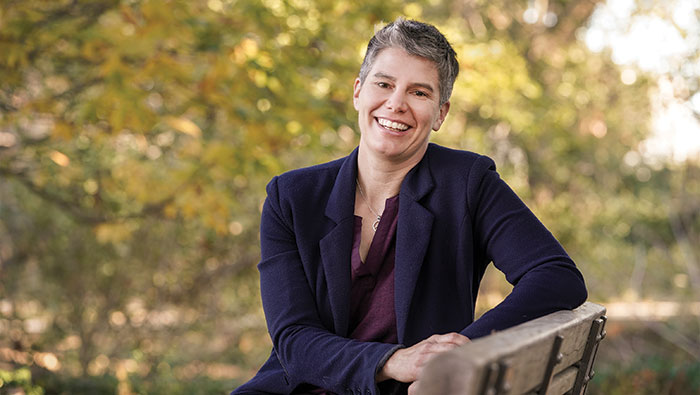
In a normal year, Yolo County Public Health Officer Aimee Sisson, M.P.H. ’07, would be working on ways to prevent chronic diseases, coordinating with local health care providers and encouraging healthy behavior for the 220,000 residents of the county.
But for now, her focus is entirely on the coronavirus pandemic. Sisson took up her new position in October, filling the vacancy left when Ron Chapman retired in June, ending a 35-year career. The pandemic was already in full swing, and Sisson had recently resigned in protest from the same position in Placer County when its board of supervisors voted that COVID-19 was no longer an emergency, supported herd immunity through infections and disputed data on the number of deaths COVID-19 was causing.
She said she doesn’t mind the 12-hour days (plus two more half-days on weekends), because the position gives her the ability to make a real difference in the lives of thousands of people all at once.
“I feel like this is exactly where I need to be,” she said. “This is exactly where all my training and experience has led me to be. That part feels very fulfilling.”
One challenge she’s facing is finding a way to convince members of the public to follow best practices like wearing face coverings and foregoing gatherings. She said she often wonders what would be more effective: issuing strict mandates or focusing on a policy of communicating the reason why precautions are so important. So far, the county has concentrated on communication rather than strict mandates. For example, when the quarantine period for people in close contact with those who have contracted COVID-19 was shortened, the county released an explanation stating that the time frame matches when researchers have said risk is highest.
“Medicine is both an art and a science — that’s even more true of public health,” she said, adding that the solution in a more normal period would be to spend time building relationships and gaining the trust of the public. She’s accustomed to introducing members of the public to healthy behavior in a much different way.
Early in her career, though, she said she felt a sense of burnout and stepped away from public health policy to pursue an organic farming apprenticeship and open her own urban farm in West Sacramento, Root Cause Farm. There she focused on making healthy food accessible to people with low income. The farm used its location across from an elementary school to introduce children to the idea that healthy food could not only be tasty, but, like biting into a beet and seeing your mouth turn red, fun.
“Farming is an extension of public health,” Sisson said. “Nutrition and having access to healthy, affordable food plays a huge role in chronic disease prevention. … Post COVID, that’s an area that I hope to get back to.”
Sisson herself has been interested in medicine since childhood, when her brother returned home from a ski trip with a copy of a Robin Cook medical thriller. Sisson picked it up and was hooked. She later read The Hot Zone, a Richard Preston book about an Ebola outbreak, and decided she wanted to investigate outbreaks of that disease.
After earning her M.D. at UCLA, she came to UC Davis as a surgery resident, thinking she might go into primary care or cardiology until she spent a summer at a Native American reservation with no sidewalks, poor access to fresh food and a high incidence of diabetes.
“I was seeing what happens when you don’t invest in public health infrastructure,” she said, noting that she then switched her focus to the Masters in Public Health program, where she now serves on the volunteer clinical faculty and co-teaches a summer seminar course.
Since changing her focus, she’s sought to ease the health inequities between different communities — a problem that has again manifested in the form of higher COVID-19 death rates in Latinx communities.
She said she hopes the coronavirus pandemic will ease and give her more time to examine chronic problems like heart disease, diabetes and obesity.
“I think about, ‘How do we design our communities to encourage people to be more physically active and so everybody has access to healthy, affordable food, and it’s safe to exercise outdoors?’” she said.
Plus, a community garden just outside her office has been calling her name.